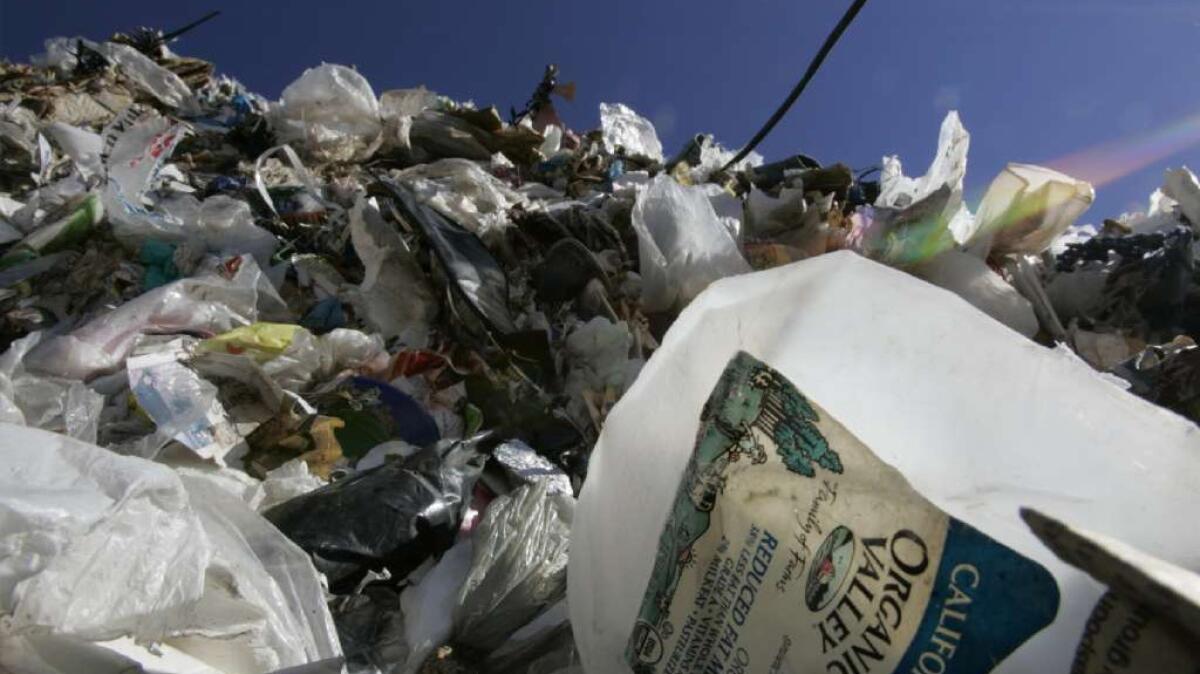From trash to treasure: Scientists turn plastic bottles and bags into liquid fuel

- Share via
In the future, perhaps we’ll be mining our landfills and fishing through our oceans for the raw materials to make fuel. Using a two-catalyst process, a joint U.S.-China team of researchers has figured out how to take discarded plastic products, from grocery bags to plastic bottles, and turn them into useful products like fuel.
The process, described in the journal Science Advances, requires less energy and creates a purer end product than other methods -- and could offer an efficient new method for turning our plastic trash into treasure.
Plastics, which are essentially extremely long chains of mainly carbon and hydrogen atoms, are made from fossil fuels. The problem is, unless they’re specially designed bio-plastics, they don’t typically degrade quickly into biologically compatible products.
“If you leave plastic in the ocean or the environment or you bury it underground, it’s going to stay there for hundreds or thousands of years,” said Zhibin Guan, a synthetic polymer chemist at UC Irvine and one of the study’s senior authors.
Take polyethylene, a really simple polymer made of just hydrogens and carbons, which happens to be the largest-volume plastic in the world (annual production, according to the study authors, exceeds 100 million metric tons). It’s ubiquitous: Three types of polyethylene, together with polypropylene, make up more than 60% of the total plastic in municipal solid waste, the study authors wrote.
So scientists have been trying to find ways to efficiently convert these plastics back into fuels or other useful molecules — but that’s not as easy as it sounds.
Here’s the problem: Polyethylene, the authors wrote, “is remarkably inert and difficult to degrade without special treatment.”
That’s in large part because the bonds between carbons are very stable and difficult to break down properly. For example, if you try to heat them at more than 400 degrees Celsius (which some methods do), they collapse into all kinds of combinations, resulting in a messy mix of gas, oil, wax and char that’s not especially useful.
For this paper, the scientists wanted to develop a method that didn’t require a lot of heat or other energy sources and that ended up with a cleaner product. So they turned to catalysts, which have often been used to build polymers but not typically to break them down.
Together with light alkanes (a simple type of hydrocarbon that’s often a waste product in refineries), the researchers used a two-catalyst process to break down polyethylene-based plastics, including a shopping bag, a plastic bottle and some food-packaging film. The first catalyst, an iridium-based compound, yanks off hydrogens attached to carbon atoms in the plastic; two of those carbon atoms, now bereft of their companions, then form double bonds with each other. Those double bonds are more susceptible than the single bonds to the second catalyst (made of rhenium, aluminum and oxygen), which uses this weak spot to help break the long chain apart. Later, the hydrogens taken by the first catalyst are added back on.
This process occurs over and over until all of that once-long polymer has been chopped into mid-sized alkanes whose molecules hold enough carbons to be a diesel fuel. Depending on how the scientists adjust various factors, such as the length of time of the reaction, they can control how much of those alkanes end up in the form of fuel or of waxes (which have industrial applications).
“I was pleasantly surprised to see these kinds of catalysts being used for such a real-world application,” said Alan Goldman, a catalysis chemist at Rutgers University who was not involved in the paper.
On top of that, he added, the fuel they make ends up being a very clean-burning one, as far as hydrocarbons go.
“It takes these undesirable refinery products and the polyethylene and combines them both into something useful,” he said of the study, calling it “a very exciting piece of work.”
So as fossil fuel reserves dwindle in the future, will we be turning to our own trash heaps instead of digging them out of the earth?
“We hope so,” said Guan, who did the work with fellow senior author Zheng Huang of the Shanghai Institute of Organic Chemistry. “We’re hoping we’re going to be providing the technology’s key components, and then with further developments and also with collaborating with industry, that we can turn it into a real useful recycling process.”
Follow @aminawrite on Twitter for more science news and “like” Los Angeles Times Science & Health on Facebook.
MORE SCIENCE NEWS
Einstein confirmed again: LIGO team detects gravitational waves for second time in just four months
Surprise! Curiosity rover finds mineral evidence of ancient Martian volcano
Coffee may cause cancer if it’s served too hot, WHO panel says




